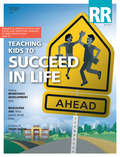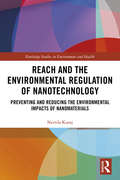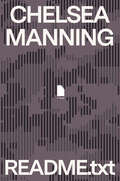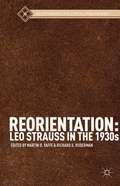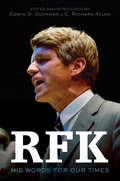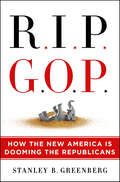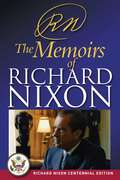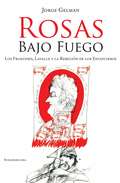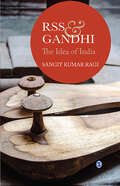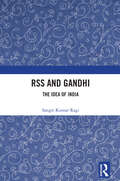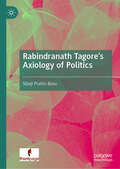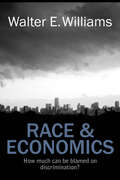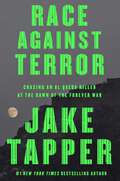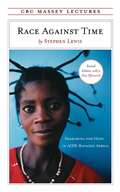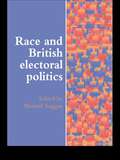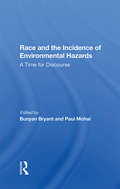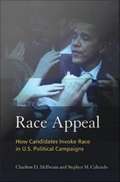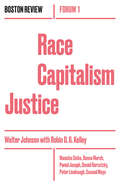- Table View
- List View
RAND Review: September-October 2018
by RAND CorporationThis issue spotlights RAND’s research on social and emotional learning; workforce development in Appalachia; and the effects of marijuana ads on adolescents and young adults.
RAND Review: September-October 2019
by RAND CorporationThis issue spotlights a wargame designed for young women interested in national security; ethics in scientific research, particularly in areas such as artificial intelligence and machine learning; and community citizen science.
REACH and the Environmental Regulation of Nanotechnology: Preventing and Reducing the Environmental Impacts of Nanomaterials (Routledge Studies in Environment and Health)
by Nertila KurajREACH and the Environmental Regulation of Nanotechnology presents a thorough and comprehensive legal analysis on the status of nanoscale chemicals under the EU’s REACH (Registration, Evaluation, Authorisation, and Restriction) regulation, asking whether it effectively safeguards human health and environmental protection. This book examines the European Commission’s claim that REACH offers the best possible framework for the risk management of nanomaterials. Through a detailed and meticulous analysis of the four phases of REACH, Kuraj assesses the capacity of the Regulation to protect human health and the environment against the potential harms associated with exposure to nanomaterials, and draws attention to the ways in which the specificities of nanoscale chemicals are (not) tackled by the current REACH framework. Overall, this book is an innovative and timely contribution to the ongoing debate on how to best address the unprecedented risks posed by the growing pursuit of nanotechnological innovation by the EU and global policy agenda. REACH and the Environmental Regulation of Nanotechnology will be of great interest to advanced students and scholars of environmental law and policy, environmental governance, science and technology studies, and environment and health.
README.txt: A Memoir
by Chelsea ManningAn intimate, revealing memoir from one of the most important activists of our time. In 2010, Chelsea Manning, working as an intelligence analyst in the United States Army in Iraq, disclosed classified military documents that she had smuggled out via the memory card of her digital camera. The army sentenced Manning to thirty-five years in military prison, charging her with twenty-two counts relating to the unauthorized possession and distribution of classified military documents. The day after her conviction, Manning declared her gender identity as a woman and began to transition. In 2017, President Barack Obama commuted her sentence and she was released from prison. In README.txt, Manning recounts how her pleas for increased institutional transparency and government accountability took place alongside a fight to defend her rights as a trans woman. She reveals her challenging childhood, her struggles as an adolescent, what led her to join the military, and the fierce pride she took in her work. We also learn the details of how and why she made the decision to send classified military documents to WikiLeaks. This powerful, observant memoir will stand as one of the definitive testaments of the digital age.
REORIENTATION: LEO STRAUSS IN THE 1930s
by Martin D. Yaffe Richard S. RudermanThe first comprehensive effort to examine Strauss's astonishingly wide-ranging writings of the 1930s (some of which have only recently been made available to English-speaking readers, including several herein) with a view to their unifying theme of recovering classical political philosophy.
RFK: His Words for Our Times
by Robert F. Kennedy Jr.An inspiring collection of Robert Francis Kennedy’s most famous speeches accompanied by commentary from notable historians and public figures.Twenty-five years after Bobby Kennedy was assassinated, RFK: His Words for Our Times, a celebration of Kennedy’s life and legacy, was published to enormous acclaim. Now this classic volume has been thoroughly edited and updated. Through his own words we get a direct and intimate perspective on Kennedy’s views on civil rights, social justice, the war in Vietnam, foreign policy, the desirability of peace, the need to eliminate poverty, and the role of hope in American politics.Here, too, is evidence of the impact of those he knew and worked with, including his brother John F. Kennedy, Lyndon Johnson, Martin Luther King, Jr., and Cesar Chavez, among others. The tightly curated collection also includes commentary about RFK’s legacy from major historians and public figures, among them Barack Obama, Bill Clinton, Eric Garcetti, William Manchester, Elie Wiesel, and Desmond Tutu. Assembled with the full cooperation of the Kennedy family, RFK: His Words for Our Times is a potent reminder of Robert Kennedy’s ability to imagine a greater America—a faith and vision we could use today.“Themes include civil rights, mistrust of large government, citizen participation in local government, eliminating poverty, and ending the Vietnam War. The speeches demonstrate Kennedy’s skill at connecting with large, enthusiastic audiences with promises of hope and equality.” —Library Journal“A blueprint for the future.” —Vital Speeches
RIP GOP: How the New America Is Dooming the Republicans
by Stanley B. GreenbergA leading pollster and adviser to America’s most important political figures explains why the Republicans will crash in 2020. For decades the GOP has seen itself in an uncompromising struggle against a New America that is increasingly secular, racially diverse, and fueled by immigration. It has fought non-traditional family structures, ripped huge holes in the social safety net, tried to stop women from being independent, and pitted aging rural Evangelicals against the younger, more dynamic cities.Since the 2010 election put the Tea Party in control of the GOP, the party has condemned America to years of fury, polarization and broken government. The election of Donald Trump enabled the Republicans to make things even worse. All seemed lost.But the Republicans have set themselves up for a shattering defeat.In RIP GOP, Stanley Greenberg argues that the 2016 election hurried the party’s imminent demise. Using amazing insights from his focus groups with real people and surprising revelations from his own polls, Greenberg shows why the GOP is losing its defining battle. He explores why the 2018 election, when the New America fought back, was no fluke. And he predicts that in 2020 the party of Lincoln will be left to the survivors, opening America up to a new era of renewal and progress.
RISK: Signposting better choices to more adventurous teaching (Practical Teaching)
by David Gumbrell39 reflections to improve your decision making in the classroom and beyond.Go on! You can do it!Are teachers becoming ever more compliant as a profession? By just quietly getting on with things there is a danger of losing that spark that attracted you to your career in the first place. However, if you feel empowered to take more risks - to take back control of how you teach - then you have the chance to reignite your passion for the job.This book follows on from David Gumbrell’s text LIFT!, arguing that when you are feeling more resilient you have the courage and confidence to take more risks. You can also calculate that risk more rationally, thereby making it less risky and more likely to result in success. As this cycle continues you become more invigorated, more inspired and thus more engaging as a teacher.A beautifully written book with David's characteristic use of rich metaphors and thoughtful narrative. This book will certainly help you make bolder and better decisions in the classroom and beyond. Adrian Bethune.
RN: The Memoirs of Richard Nixon
by Richard Nixon“Informative, explicit, even suspense-ridden.…An important source for students of the Nixon presidency.” —The New York TimesFormer President Richard Nixon's bestselling autobiography is an intensely personal examination of his life, public career, and White House years. With startling candor, Nixon reveals his beliefs, doubts, and behind-the-scenes decisions, shedding new light on his landmark diplomatic and domestic initiatives, political campaigns, and historic decision to resign from the presidency. Memoirs, spanning Nixon’s formative years through his presidency, reveals the personal side of Richard Nixon. Witness his youth, college years, and wartime experiences, events which would shape his outward philosophies and eventually his presidency—and shape our lives. Follow his meteoric rise to national prominence and the great peaks and depths of his presidency. Throughout his career Richard Nixon made extensive notes about his ideas, conversations, activities, meetings. During his presidency, from November 1971 until April 1973 and again in June and July 1974, he kept an almost daily diary of reflections, analyses, and perceptions. These notes and diary dictations, quoted throughout this book, provide a unique insight into the complexities of the modern presidency and the great issues of American policy and politics.
ROSAS BAJO FUEGO (EBOOK)
by Jorge Daniel GelmanJuan Manuel de Rosas ocupa un lugar central en la historia argentina. Tanto por su papel fundamental en la construcción de un nuevo orden político luego de la revolución de independencia, como por el hecho de que ese mismo orden fuera utilizado a modo de ejemplo, positivo o negativo, para la lucha política hasta el presente. Rosas fue acusado de tirano, asesino, caudillo populista, representante de los intereses de los grandes estancieros o, al revés, reivindicado como defensor de los intereses nacionales y del pueblo. Su polémico protagonismo en las disputas del presente dificultó el estudio más a fondo de su gobierno y el análisis de los medios que utilizó para lograr la instauración de un nuevo orden, tras el fracaso de todos los intentos hechos desde 1810. Este libro se propone desentrañar los mecanismos y las herramientas que fueron claves en la construcción de su poder. Para ello analiza en detalle una coyuntura apasionante, que lo colocó al borde del abismo, acosado simultáneamente por un ataque naval francés que se extendió entre 1838 y 1840, el levantamiento rural de #los Libres del Sur# y una invasión del territorio de Buenos Aires encabezada por su rival unitario Juan Lavalle. El análisis de esta etapa en la que todo parecía posible permite observar cómo se pone en acción un conjunto muy amplio de estructururas y de actores, de un lado y del otro, y a la vez entender cómo logró Rosas vencer a esos enemigos tan poderosos. Siguiendo de cerca este proceso podremos observar también cómo la propia dinámica del enfrentamiento transforma el régimen de Rosas, a la vez que permite imponer la autoridad del Estado sobre otras bases.
RSS and Gandhi: The Idea of India
by Sangit Kumar RagiRSS and Gandhi: The Idea of India analyses the ideas of Gandhi and the RSS to understand how and where they converge on and diverge from each other in key questions that India continues to debate even today. The discourse on Gandhi and the RSS encompasses a fascinating debate in social, civilizational, cultural, political and religious questions which affianced the Indian minds towards nation building, both before and after independence. This book also examines their positions on issues and themes, where they may seem standing on the same page but reflect a tangential dispersion regarding means and methods. It discounts and dispels the predominant view that Gandhi and the RSS are diametrically opposed in their ideas on India and the Indian nation.
RSS and Gandhi: The Idea of India
by Sangit Kumar RagiThis book explores the relationship between Mohandas Karamchand Gandhi and the Rashtriya Swayamsevak Sangh (RSS) and discusses their relevance in India’s history and socio-political discourse. It looks back at the Indian independence movement and the key debates and issues that the country was confronted with in the early 1900s that continue to be relevant today. These include the practice of untouchability, tensions and conflicts between communities, the treatment of minorities and the marginalized, debates on the ideology of Hindutva, religious conversion, questions on the cultural and civilizational identity of India, and responses to Western modernity. This book discusses the ideological differences between Gandhi and the RSS while also focusing on areas where they converged. This book will be of interest to students, researchers, and academics working in the areas of modern Indian history, political science and philosophy. It will also be interesting to general readers curious about Gandhi and the RSS.
Rabbi Meir of Rothenburg and the Foundation of Jewish Political Thought
by Joseph Isaac LifshitzThis book is a scholarly examination of the political thought of Rabbi Meir (Maharam) of Rothenburg, the most important thirteenth century German Rabbi who was associated with the Pietist movement of the period. From the Maharam's responsa on community matters, a coherent political thought emerges that exercised nearly unprecedented influence on European Jewish communities up to the Jewish Emancipation. Rabbi Meir's extremely sophisticated attempt to balance the demands of the community against those of the individual was facilitated by a characteristic three-tiered structure to his political thought: concrete legal rules supported by value-laden legal principles built upon his general religious ideology. Through a systematic analysis of the Maharam's political thought, Isaac Lifshitz offers an original contribution to Jewish studies, political theory, and the study of legal philosophy. By considering the legal and theological underpinnings of one of Medieval Jewry's most influential figures, it also makes a contribution to the history of ideas in the Medieval period.
Rabindranath Tagore's Axiology of Politics
by Sibaji Pratim BasuThis book revisits Rabindranath Tagore’s opinion and standpoints on constituent elements of politics from the stance of this marker––axiology, so that many well-known aspects of his thought may be seen in a different light. Among the Indian luminaries of the first half of the twentieth century, who were well-known both in the East and the West, Rabindranath Tagore (1861–1941) was arguably the most ‘gifted’ personality. Besides being the first non-European recipient of the Nobel Prize for Literature (1913) and the ‘ambassador’ of Indian culture to the West, he also wrote voluminous essays and letters on socio-political issues––engaged himself in various protests against the raj, as a pacifist in international arena and also as a polemical writer. Tagore is often described as the ‘conscience’ of the Indian nation. This book includes a long Tagore-Einstein conversation and a longish dialogue with H G Wells and his creative writings––poems, fictions, plays, and ‘personal’ letters––along with his direct political discourses to understand his Political Thought in a more comprehensive way.
Rabindranath Tagore's Ideational Universe
by Bidyut ChakrabartyThis book explores Tagore’s socio-political ideas through his novels, short stories, and essays. It looks at Tagore beyond his literary achievements and examines his notions of friendship, religion, nationalism, civilization, and knowledge. It highlights his uniquely textured and innovatively argued views on critical aspects of humanity in the tumultuous phase of Indian nationalist campaign that also witnessed a kaleidoscope of myriad ideological voices, besides the hegemonic mainstream nationalist campaign, led by Gandhi. It captures the bard’s creative ideational priorities and his attempts to radically transform the prevalent socio-economic and politico-cultural environment. The volume will be of great interest to scholars and researchers of history, politics, literature, and South Asian studies.
Rabindranath Tagore's Theatre: From Page to Stage
by Abhijit SenThis book analyses Rabindranath Tagore’s contribution to Bengali drama and theatre. Throughout this book, Abhijit Sen locates and studies Rabindranath’s experiments with drama/theatre in the context of the theatre available in nineteenth-century Bengal, and explores the innovative strategies he adopted to promote his ‘brand’ of theatre. This approach finds validation in the fact that Rabindranath combined in himself the roles of author-actor-producer, who always felt that, without performance, his dramatic compositions fell short of the desired completeness. Various facets of his plays as theatre and his own role as a theatre-practitioner are the prime focus of this book. This book will be of great interest to students and scholars in Theatre and Performance Studies and most notably, those focusing on Indian Theatre and Postcolonial Theatre.
Rabindranath Tagore: Peace in an Enchanted World (Peacemakers)
by Bindu PuriThis book explores Rabindranath Tagore’s distinctive argument for peace—in spiritual rather than in political—terms. Drawing on seminal texts by Tagore, the book presents the reader with a comprehensive overview of Gurudev’s seemingly contradictory notions of individual freedom, universal love for humanity and faith in the great Eastern nation. It underlines Tagore’s argument that peace could be best affected not by a league of nations but in educational institutions and that the “Religion of Man” lay in the truth of inter-relationships between human beings.A concise handy guide to Tagore’s philosophy, this book will be essential for students and scholars of philosophy, Tagore studies, peace and conflict studies and South Asian studies.
Rac(e)ing to Class: Confronting Poverty and Race in Schools and Classrooms
by H. Richard Milner IVIn this incisive and practical book, H. Richard Milner IV provides educators with a crucial understanding of how to teach students of color who live in poverty. Milner looks carefully at the circumstances of these students&’ lives and describes how those circumstances profoundly affect their experiences within schools and classrooms. In a series of detailed chapters, Milner proposes effective practices—at district and school levels, and in individual classrooms—for school leaders and teachers who are committed to creating the best educational opportunities for these students. Building on established literature, new research, and a number of revelatory case studies, Milner casts essential light on the experiences of students and their families living in poverty, while pointing to educational strategies that are shaped with these students' unique circumstances in mind. Milner&’s astute and nuanced account will fundamentally change how school leaders and teachers think about race and poverty—and how they can best serve these students in their schools and classrooms.
Race & Economics: How Much Can Be Blamed on Discrimination?
by Walter E. WilliamsWalter E. Williams applies an economic analysis to the problems black Americans have faced in the past and still face in the present to show that that free-market resource allocation, as opposed to political allocation, is in the best interests of minorities. He debunks many common labor market myths and reveals how excessive government regulation and the minimum-wage law have imposed incalculable harm on the most disadvantaged members of our society.
Race Against Terror: Chasing an Al Qaeda Killer at the Dawn of the Forever War
by Jake Tapper&“Not only riveting to read but also shines an essential light on the quest for justice in the modern age of terrorism.&” —David Grann, #1 New York Times bestselling author of Killers of the Flower Moon In this thrilling true story, #1 New York Times bestselling author Jake Tapper uncovers an investigation—unlike any other in American history—to lock up a dangerous terrorist before he&’s set free.June 2011: The case has been cold for nearly ten years when a terrorist fleeing the Arab Spring turns himself in and confesses to killing American soldiers in Afghanistan. This brazen act sets off an unlikely chain of events that puts the entirety of the American justice system to the test. They have the killer, but no evidence to prove the murders happened. Determined to deliver justice, a team led by federal prosecutors Dave Bitkower and Shreve Ariail must traverse the globe, uncovering facts across thousands of miles and tracing shocking plots of terror in order to prevent tragedy from striking again. Through intense reporting and meticulous recreation, Race Against Terror shows a man radicalized to enact violence, courageous soldiers who risked their lives for each other, and the diverse set of men and women who work tirelessly to stay one step ahead of disaster. In this gripping narrative history CNN&’s Jake Tapper reveals the true costs of the War on Terror and delivers a salient warning for the increasing threats of extremism we face to this day.
Race Against Time: Searching for Hope in AIDS-Ravaged Africa (The CBC Massey Lectures)
by Stephen Lewis"I have spent the last four years watching people die." With these wrenching words, diplomat and humanitarian Stephen Lewis opens his 2005 CBC Massey Lectures. Lewis's determination to bear witness to the desperate plight of so many in Africa and elsewhere is balanced by his unique, personal, and often searing insider's perspective on our ongoing failure to help. Lewis recounts how, in 2000, the United Nations Millennium Summit in New York introduced eight Millennium Development Goals, which focused on fundamental issues such as education, health, and cutting poverty in half by 2015. In audacious prose, alive with anecdotes ranging from maddening to hilarious to heartbreaking, Lewis shows why and how the international community is falling desperately short of these goals. This edition includes an afterword by Lewis, covering events after the lectures were delivered in fall 2005.
Race And British Electoral Politics
by Shamit SaggarThis text examines key themes pertaining to the study of race and electoral politics. Addressing an issue which is of immense topical interest, it offers comprehensive coverage of key topics. Providing both an historical and theoretical analysis of race and ethnicity in politics, the contributors examine the participation and influence of ethnic minorities in electoral politics at both ends of the political spectrum. "Race and British Electoral Politics" should be of value for students studying British politics, particularly those taking course options on electoral politics, race, ethnicity and comparative politics.
Race And The Incidence Of Environmental Hazards: A Time For Discourse
by Bunyan Bryant Paul MohaiThis book discusses the poor and people of color and their struggle to take control of one of the most basic aspects of their lives: the quality of their environment. It exposes the fact of environmental inequity and its consequences in face of general neglect by policymakers and social scientists.
Race Appeal: How Candidates Invoke Race in U.S. Political Campaigns
by Charlton D. Mcilwain Stephen M. CaliendoIn our evolving American political culture, whites and blacks continue to respond very differently to race-based messages and the candidates who use them. Race Appeal examines the use and influence such appeals have on voters in elections for federal office in which one candidate is a member of a minority group. Charlton McIlwain and Stephen Caliendo use various analysis methods to examine candidates who play the race card in political advertisements. They offer a compelling analysis of the construction of verbal and visual racial appeals and how the news media covers campaigns involving candidates of color. Combining rigorous analyses with in-depth case studies-including an examination of race-based appeals in the historic 2008 presidential election-Race Appeal is a groundbreaking work that represents the most extensive and thorough treatment of race-based appeals in American political campaigns to date.
Race Capitalism Justice (Boston Review / Forum #1)
by Robin D. G. Kelley Walter JohnsonRace Capitalism Justice urges us to embrace a vision of justice attentive to the history of slavery not through the lens of human rights, but instead through an honest accounting of how slavery was the foundation of capitalism, a legacy that continues to afflict people of color and the poor. Inspired by Cedric J. Robinson's work on racial capitalism, as well as Black Lives Matter and its forebears including the black radical tradition, the Black Panthers, South African anti-apartheid struggles, and organized labor, contributors to this volume offer a critical handbook to racial justice in the age of Trump.
